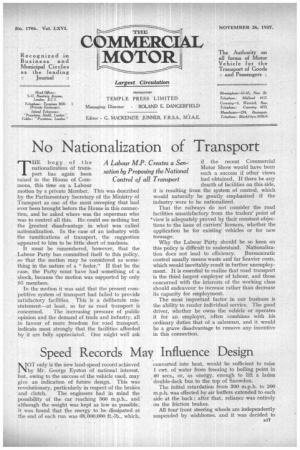No Nationalization of Transport
Page 1

If you've noticed an error in this article please click here to report it so we can fix it.
THE bogy. of the nationalization of transport has again been raised in the House of Commons, this time on a Labour motion by a private Member. This was described by the Parliamentary Secretary of the Ministry of Transport as one of the most sweeping that had ever been brought before the House in this connection, and he asked where was the superman who was to control all this. He could see nothing but the 'greatest disadvantage in what was called nationalization. In the case of an industry with the ramifications of transport, the suggestion appeared to him to be little short of madness.
It must be remembered, however, that the Labour Party has committed itself to this policy, so that the motion may be considered as something in the nature of a "feeler." If that be the case, the Party must have had something of a shock, because the motion was supported by only 95 members.
In the motion it was said that the present competitive system of transport had failed to provide satisfactory facilities. This is a deliberate misstatement—at least, so far as road transport is concerned. The increasing pressure of public opinion and the demand of trade and industry, all in favour of more freedom for road transport, indicate most strongly that the facilities afforded by it are fully appreciated. One might well ask if the recent Commercial Motor Show would have been such a success if other views had obtained. If there be any dearth of facilities on this side, it is resulting from the system of control, which would naturally be greatly emphasized if the industry were to be nationalized. • That the railways do not consider the road facilities unsatisfactory from the traders' point of • view is adequately proved by their constant objections to the issue of carriers' licences, whether the application be for existing vehicles or for new tonnage.
Why the Labour Party should be so keen on this policy is difficult to understand. Nationaliza tion does not lead to efficiency. Bureaucratic control usually means waste and far heavier costs, which would inevitably result in further unemployment. It is essential to realize that road transport is the third largest employer of labour, and those concerned with the interests of the working class should endeavour toincrease rather than decrease its capacity for employment.
The most important factor in our business is the ability to render individual service. The good driver, whether he owns the vehicle or operates it for an employer, often combines with his ordinary duties that of a salesman, and it would be a grave disadvantage to remove any incentive in this connection.






























